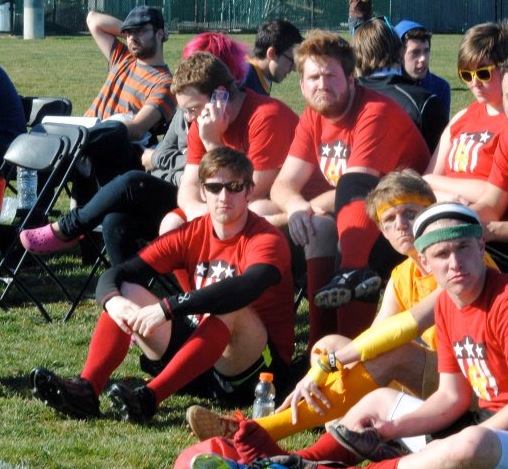- Rule, Britannia, no more?
- Unpopular Opinions: US Quadball Cup 2023
- Proven Contenders: University of Virginia
- Proven Contenders: Rutgers University
- Proven Contenders: University of Michigan
- Proven Contenders: Creighton University
- Different Perspectives: A Look Inside USA Ultimate
- Antwerp QC, Much of Belgian Core, Leaves Competitive Quidditch
How to Learn from Defeat
- Updated: March 9, 2013


After a disappointing Western Cup, Utah will look to reexamine and rebuild in the face of disappointment. Credit: April Gonzales
In November, Villanova’s Zach D’Amico wrote this article about the ecstasy of victory, after his team won the Mid-Atlantic Regionals. This is the flipside to that article: dealing with the agony of defeat and disappointment.
The regional qualifiers for World Cup VI are finished. 60 teams have punched their tickets to Florida, and will see their goals and dreams of competing on the sport’s top stage realized. We’ve seen the excitement, the joy of qualification. These success stories serve as inspiration to the quidditch community, helping to remind us all of the beauty that can be found in the sport through achieving your goals.
But not everyone has had a chance to feel the same joy. After all, the point of qualifiers is that there are only a limited number of spots available. And for those that came up short, especially those that came in with such high expectations, the ecstasy is replaced with disappointment
We seldom hear their stories, because the winners write history. But we can learn just as much from defeat as from victory, even if it is painful and uncomfortable to do so.
First, use your defeat as an honest analysis of your abilities and execution of strategy. We often have inflated opinions of ourselves and our abilities, and as long as we are still winning and reaching our goals, we don’t question that analysis. Defeat and disappointment, however, humble us sufficiently enough to make us question what we could have done differently. This questioning is a good thing. It makes us take an honest assessment of ourselves, our skills and abilities, and our weaknesses.
After Utah failed to qualify for World Cup, it made me take a hard look at what I had done at the tournament that had been ineffective, or that had contributed to our losses. I realized that, despite being one of the veteran players on the team, I had actually displayed poor decision-making abilities on-pitch for most of the tournament. Without the disappointment of defeat, I would have never questioned my decision-making abilities, because I had supposed them to be a strength before the tournament. Now, I am able to look at that as an area to work on and improve. Defeat and disappointment has helped me to devote more time and energy to improving an area of need that I hadn’t previously realized was even a weakness.
It is important to note, however, that it’s not useful to just dwell on the “what-ifs” of a defeat. That just isn’t productive, as it doesn’t help you take an honest look at yourself. Instead, it makes you look at things through the tinted glasses of regret and wonderment.
Right after we were eliminated from Western Cup, it was easy for me to think “Well, everything would have been different if half our starters hadn’t been injured.” But blaming injuries for our mistakes and shortcomings is neither honest nor productive. Yes, not having so many key players injured would have had some positive effects, but it didn’t cause us to make the individual mistakes we did.
Disappointment also serves as a great source of motivation. That pain and agony we feel is something we don’t ever want to feel again, so we can use it to push us to improve. When you get tired during practice and don’t want to keep practicing, use that memory of pain to push yourself to keep working. When you want to increase your physical capabilities but find yourself struggling with motivation to do the necessary workouts, use that defeat as motivation.
For a powerful example of the power of defeat as a motivator, we can look at college football. The following video is of University of Florida quarterback Tim Tebow, who had previously won the Heisman Trophy — college football’s equivalent of a Most Valuable Player award. His team had just earned their first loss of the season, to a team ranked much lower than them.
Tebow did indeed stay true to his words in this video, and would lead Florida to the National Championship game that season, which they won. Using defeat and disappointment as a motivator, Tebow pushed himself to be the best quarterback he could be, and it paid off for him and his team, allowing them to reach the pinnacle of their sport.
Defeat in any sport is painful. In quidditch this is especially true, as for many of us this is the last large-scale organized sport we will compete in. But, if used properly, it can also be a powerful tool to help us become the best quidditch players and teams we possibly can.

2 Comments